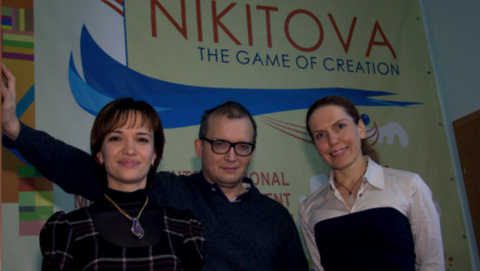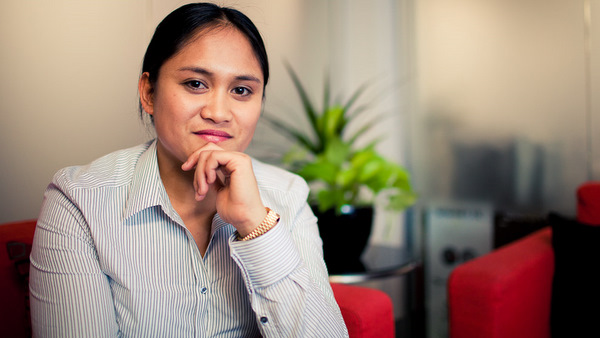As some lucky parents have it, the passion they hold for their own careers can end up rubbing off on their offspring. Maryann Duringer Klingman, a seasoned producer at Disney Interactive’s Playdom and a professional who has spent two decades in the videogame business, saw it happen with her daughter Theresa. Partially due to her mother’s career, but mostly out of her own insatiable appetite and interest for everything digital, Theresa Duringer followed in her mother’s footsteps becoming a versatile game professional. I sat down with Maryann and Theresa to talk about their shared passion for the game biz, where it all started, and what both generations were able to learn from each other.
One career rebooted, another one sprouted
Back in 1993, after almost 10 years of being an at-home mom with one of her two daughters in elementary school, Maryann Duringer Klingman rediscovered her appetite for a career again.
“I rejoined the workforce working full-time again as an administrative assistant at Electronic Arts’ educational software department in November of ’93 and quickly went up through the ranks as a producer,” Maryann recalls. “I was fortunate enough to work with the some of the best children’s brands and licencors, including Sesame Workshop, Marc Brown Studios, Nickelodeon, Warner Brothers and DC Comics. I produced educational games with such characters as Bert and Ernie, Spongebob Squarepants and Reader Rabbit.”
Theresa Duringer, the younger of two sisters and only ten years old at that time, grew up with quite the appetite for technology and a penchant for creative, technical tinkering. “As a kid I was pretty shy,” Theresa admits. “We always had a computer, and I would tinker on it for hours, dabbling with scripting, making websites, and meeting other kids on IRC a million miles away.”
Theresa would even start modding games and submit her own art to different projects. “It just clicked for me. I got this incredible energy from seeing the art I was making come alive on the screen. Even with friends from school, we would make up our own board games, which was probably even more fun than playing them. I still remember printing out our own adventure-game playing cards on an accordion of dot-matrix card stock my dad brought home from work.” Her passion for drawing since a young age could be seen everywhere, from the margins of her notes from school to books and mirrors at home. “Growing up in Silicon Valley, having a programmer father and video game producer mother, and being surrounded by creative tech types gave me a familiarity with the industry that let me dive in and thrive in game development.”
Through the ranks at EA, just like mom
Three years later, after graduating from Berkeley, Theresa went right back to testing games and landed a testing job at EA. After several months of working as a tester for EA’s The Godfather, she was appointed to being the main contact for her QA team to share their findings directly with the production team. “One thing that is also cool about working at EA is that they really recognize talent from the testing group and give testers opportunities to prove themselves with bigger projects to work themselves out of testing into production,” she says. “It’s from testing The Godfather that I was able to work my way up from tester, to community manager and end up in production at Maxis.”
According to Theresa, the most important thing a tester can do while working your way up from testing to development, besides working very hard, is to hang out with the developers as much as possible. This is known to be a tricky challenge, as testers and the ‘testing pits’ they work in are often segregated from the development teams. Theresa had her own way of making sure that kind of contact was possible.
“I started out on a dedicated testing floor, and didn’t have any development contacts at EA. I ended up buying popcorn for a fundraiser from one of the lead’s kids in order to have an opportunity to march over to his office, pick up my popcorn, and make my case for why I wanted to join the dev-test team over at Maxis.”
Theresa’s one-on-one with the lead paid off and got her a foot in the door to a team she would later join at at Maxis. “I participated in Art Lunch, Board Game Night, rallied folks to go on Bike Lunch Fridays, and hung out in general with as many developers as I could who had common interests with me, even taking up a few new hobbies like Victorian ballroom dancing and even rock climbing.”
“The more you interact with the developers, the firmer an idea you can form about which specific jobs would compliment your talents, and what kind of team you would mesh with,” Theresa suggests. “You’ll also have advocates when you go for that new opening. Try not to stagnate in testing too long.”
One way Theresa learned to break through the glass sealing of being a tester was to invest in herself outside of your working hours. “In my case, I learned to be proficient with JavaScript, CSS, Flash, and Photoshop, which were vital skills when I joined the Pollinated Ninjas [the online team for Spore]. At the end of the day, I really wouldn’t recommend my path from test to dev. A testing job is easy to land, and you’ll get your foot in the door, but you’ll spend valuable time in a sector you may not be passionate about. If I could do it again, I would find hackathons, game dev jams, and contests in my area to connect with other like-minded folks and build my talents collaborating on projects, then directly apply to a development position. The testing route was a roundabout way to get where I am.”
While at Maxis, Theresa would first be put in charge of being a community manager for Spore, before she later became assistant producer on Dark Spore. “I once again got to see her bring that creativity to life in the little programs that she would write for her work,” Maryanne says. “She took on some responsibilities at Maxis that, as parent, you’re just really proud of.”
Having a mother who had grown through the ranks of the same company two decades before not only gave Theresa a source of inspiration and support, but also a place for comfort and advice. “I’ve learned to not take the first offer and really push ahead while still being professional. My mom’s gone through it all, so she really can help, lend an ear and provide advice when I need it,” Theresa says.
“I’m very proud of her,” Maryann adds. “I believe Theresa was very quickly identified at EA as someone who could take all feedback and information, assimilate it, write a complete sentence and then share that with the entire team.”
As an assistant producer at Maxis, Theresa was able to explore the full range of strengths and weaknesses. “When I was working on Spore as a tester, I didn’t have a ton of influence on the game or decisions,” she says. “But once I moved into community management, I was able to craft that user experience from outside the game. It was a challenge because I’ve never done it before. “Another challenge for Theresa was to rely on someone else than herself. “I would find a community member who was really excited to put their energy in moderating the forums and then engage them, asking them to think about ways of ranking Spore creations made by community members. Eventually I would provide the community member with production tools and rely on that individual completely to moderate the forums. That was not intuitive to me because I’m a doer, but you can’t always do everything yourself.”
Learning together
While Theresa is currently exploring the exciting challenge of being an indie game developer, her mother recently got back to her production roots. Previously working at Playfirst as their developer relations manager, Maryann saw an opportunity to find another challenge at Playdom.
“My previous position at Playfirst was more of a business position where I was out basically meeting and greeting with the development community,” She explains. “I was responsible for sourcing production talent to work with my organization. Over the years of working with external development studios, I learned about contracts, negotiations and the business side of gaming; all useful skills when working with external partners. Although I enjoyed business development a production opportunity presented itself at Playdom. I would get to work with talented individuals, many of whom I have worked with in the past and whose careers I have watched grow over the years. It is a pleasure to see individuals whom I initially met as testers or producers now comfortable and successful as senior producers and studio managers.”
People often get surprised when they get to hear that Theresa’s mother is also a game producer. Most find it the most amazing thing ever, and it’s hard to disagree. “She is someone I can rely on, she’s one hundred percent honest with me and gives me the advice that might not always be exactly what I want to hear,” Theresa says.
“I try to live my life as an example,” Maryann says. “What Theresa gleaned from her childhood and chose to pursue as an adult has more to do with how she comes to her life. I provided an environment where she could feel comfortable being herself and I exposed her to my work life. It was up to her to choose her path. Having said that, I did provide a home where creativity was appreciated and intelligence respected. And we played games! If I influenced Theresa, it was that she saw what I did for my work, and that I enjoyed it; the game industry was familiar and appealed to her.“
“Its exciting to see your child grow into their adult life and then move into a career and be successful at it,” Maryann adds. “Seeing my daughter moving through ranks from testing to community manager and producer and to see her teaching herself programming and being an artist, makes me very proud as a parent.”
“I want other women to negotiate more and not settle so easily,” Theresa says. “My mom is awesome at this, and I always love to hear her stories about mediation and negotiation. I push myself to follow her lead. Also, I think there can be a bit of a locker room vibe at game companies, often times just because there are so many guys. For me this was intimidating, but I’ve learned that my differences can actually help me set myself apart and be noticed. I’m so pleased to hear more and more women talking about their game development projects lately, so hopefully this will change soon. I also think women get nudged into marketing and management positions. If this is your passion, wonderful, but if you want to be engineering and get your hands dirty in game dev, hold your ground. Come up with a clear goal for how you want to contribute to games and go for it.”
Going Indie
Most recently, Theresa also made the exciting career move and decided to become an independent game developer. Together with her team at Turtle Sandbox Games, she is responsible for the up-and-coming 2D action strategy game Cannon Brawl, which was recently featured as one of the Pax 10 top indie games and had previously won the 1st place at Activision’s 2011 Independent Games competition.
The initial spark to consider becoming indie came after Theresa had moved from the EA testing pits to Maxis, showing her a different atmosphere in a smaller studio where you could easily get to know everyone and remember their name. “I liked the ability to wear more than one hat, and to have my work really matter,” she says. “I didn’t feel so much like a cog in the machine. The idea of going indie became intriguing once I started really getting to know what I loved doing, which was being creative, and making games.”
Theresa was able to work on a small flash game called Psychic Spore, intended as an example for kids who wanted to dive into the Spore API to make their own games. “I had so much fun working on this, and I knew I wanted to make smaller games where I could make more of an impact and really have creative liberty,” she adds
Theresa is the lead artist on Cannon Brawl. Another quite daring leap into a role she had not yet been fully in charge of before. “I did some art for Maxis, but a lot of that was graphic design focused for UI or website interface. Now I’m doing characters, backgrounds, animation, all kinds of things I’ve never done professionally before. It’s a ton of fun, and I’m pushing myself to learn as I go.”
Seeing her daughter take that daring leap, Maryann couldn’t be any prouder. “I’m impressed with Theresa’s choice,” Maryann says. “Not only that she is confident enough to establish a business, but also that she managed her finances so that she could take the time required for this entrepreneurial endeavor. I have watched Theresa grow into a capable and fearless woman. I have seen in her a willingness to jump in and just get the job done, whether it is pulling together the daily QA report, organizing a San Francisco conference for Spore fans, building a community web site, teaching herself C++ or starting her own game development company. As a seasoned producer and as her mother, I am delighted with how she has plugged in to the industry and now finds herself between all of the industry’s up-and-comers.”
“As a game professional, she has also shown me that there are alternative avenues to success and the independent game developer route is a viable option,” Maryann says. ”Even if Theresa returns to work for a large company at some point, she will have an impressive background in game development to offer.”
Theresa Duringer is continuing her work on Cannon Brawl, which is scheduled to launch later this year. Maryann Duringer Klingman is now working on various unannounced projects at Disney Interactive’s Playdom.




















